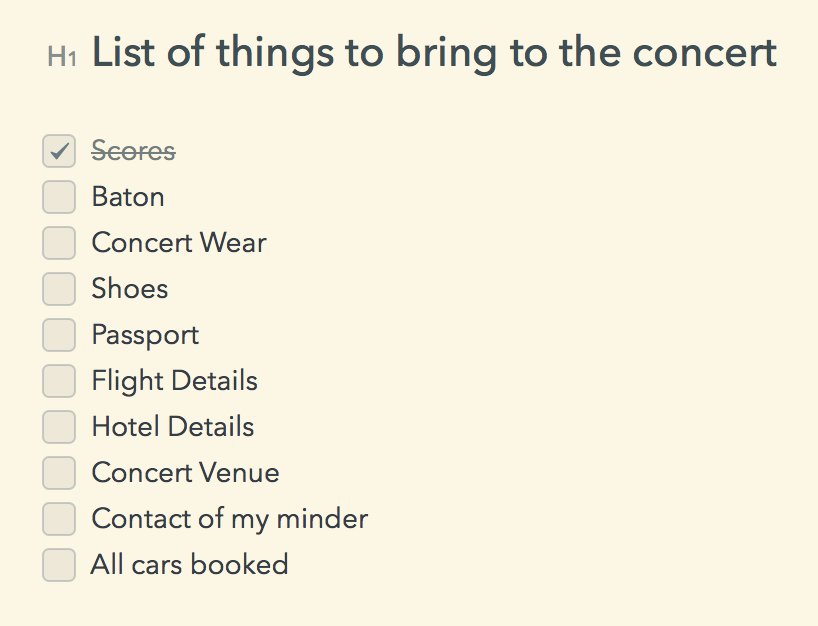Preparing for a concert is a bit like preparing for a job interview; with the exception that you face a panel of 80 or so players, staring and waiting to decide in the first five minutes of a rehearsal if you're the worst candidate in history or not. That first three-hundred seconds can make or break you, regardless if you have a baton in your hand or just a good old CV - and as anyone who has been successful in an interview knows, it's all in the preparation. So how does this conductor prepare for those three-hundred seconds?
First Steps
My first step is getting a job in the first place! There is a technique to this, and it's mostly called luck. After that, add in a peppering of contacts, mix in the ability to blackmail a concert promoter with the secret photos of them and the local sheep, and finally garnish with a bit more luck, and Bob's Your Uncle. Now I have the job, I need the music.
Well over half of the concerts I conduct I orchestrate. This means it's my responsibility to fill the orchestral blank pages with squashed flies and hope they sound harmonious. Orchestration is a complicated affair and one that I'll explore in another post. That leaves the other half of my concerts where the music is already written. It's the promoter or orchestras responsibility to post out the substantial, A3 sized scores to me; and when the postman rings the doorbell, I have a mixture of excitement and mild panic at the mountain I'm about to climb.
The Score
The conductor's score is a culmination of all the individual instrumental parts. It has every element that'll be performed on the page, so that means a lot of information crammed into a relatively small space; similar to a miniaturised version of the Bible without the whole parting of the seas thing.
Once I have my scores, I'll try to find existing recordings of the work. It's a lot easier studying the scores knowing how the piece actually sounds. If I am allowed to keep my scores, then I'll use brightly coloured pens to make notes. In a pressured environment such as a concert, the last thing I need is to look down at a faint pencil mark and wonder what on earth I've written. If however, I need to return the scores after the concert, then I have no choice but to use a pencil. But what do I doodle on my page?
Here is a perfect example. When I have a new orchestra with only a three-hour rehearsal and straight into a performance, one of my primary responsibilities is to give confidence to players by being clear with their entry. A player may sit for twenty bars or more without a single note, and instead of dreaming about their next holiday, they have to count the empty bars so they can enter successfully when they need to play next. If you have ever tried to do this, it's surprisingly easy for your mind to wonder, and before you know it, you have no idea how many bars are left before you need to play. This is where I can help, look at them and indicate that they need to play. As there are literally thousands of entries in a piece of music, I can't be there for everyone, so I need to choose the entries that will make a real difference if it's missing. This red marking is telling me 'make sure this player is going to play the part, and if needed, help them out'.
This is a score from a concert I'm about to conduct in Poland with Stewart Copeland. It's a European tour called 'Light Up The Orchestra' showcasing some of Stewart's film music. From looking at the scores, I could immediately see one of the main challenges will be rhythm. As Stewart is probably the world's most famous drummer, and their main occupation is hitting things as hard as possible to complicated rhythms, it's no wonder that his orchestral works need Einstein to figure out the rhythm.
Predicting Problems
To a non-musician, rhythm is a difficult concept to understand; 'how do you read those dots in real time and play your instrument, not only figuring out what note to play but in what rhythm?' But reading music is just the same as reading this article. Your brain learns patterns incredbly quickly, it summarises the word and makes an educated guess at what it says. If a word is spelt wrong, you can still read it successfully, and sometimes you'll not even notice. Did you realise I spelt the word 'incredibly' wrong in the penultimate sentence? Your brain uses the same technique with rhythm on a sheet of music. There are probably only 30-50 everyday rhythms, so once they are learnt, they seem natural. Unfortunately, Mr Copeland clearly thought this was boring, so he decided to use rhythmic structures that are challenging. And although they look complicated on the page, once you've figured them out, they 'feel' very natural and one just has to remember to 'feel' the rhythm when playing rather than analysing it. And the reason for telling you all this? I can safely predict which rhythms will be tricky for the orchestra, so I need to learn them in advance; or I'll be another puzzled musician with a metaphorical question mark above my head; which is no use to anyone.
Discovering The Unusual
After figuring out which entries I need to be aware of, and any challenging features of the music, I need to check for out-of-the-ordinary techniques. The beautiful thing about music is that the rules are flexible, and creativity is king. So if a composer instructs a player to pluck the strings inside a piano, or the percussionist to use a typewriter for a sound effect, I need to know this in advance. The strangest thing in Stewart Copeland's music is to play the guitar like 'Hank Marvin', the percussionist needs a 'Trash Can' to hit, and the pianist needs to play a cluster of notes with his elbow - so I think I'm safe!
After discovering all of those things, I just need to practice conducting any tricky parts and read the scores as much as possible to immerse myself in the music. If I do this well enough, I can stand in front of the orchestra and hopefully pass the test!
Checklist
Leading up to the big day, and for me that is flying to Poland at 5am on Saturday morning, I need to tick off my checklist:
And yes, this list is essential. I once conducted for Raymond Blanc at his world-famous restaurant Le Manoir aux Quat' Saisons in Oxfordshire, and I completely forgot to bring any concert clothes. Thankfully I realised just in time for my assistant to break into my house and drive up the motorway to meet me ten minutes before curtain up. I've also forgotten my baton many a time, have left all my music at home and had to reprint all 1,000 pages at the venue. Most hilariously, I forgot to bring shoes to a memorial concert (where I thought it was only proper to wear footwear!), so I sent my mother out to High-Quality-Footwear Street in Blackpool (sadly she couldn't find that specific street so ended up at Primark) to buy me a pair. I've even forgotten my belt, and as my trousers were on the large side, I thought the idea of accosting an audience member to borrow a bit of black leather was a more appropriate option than the audience watching my bottom wobble around.
Wish Me Luck
So as you can see, being a conductor is much more than turning up and waving a stick. It's turning up, waving a stick and pretending to know what you're doing with limited prep time. At the end of the night, if I'm not booed off stage by the orchestra, I know I've done well. With any luck, the next candidate isn't as well prepared as I am, or I may need to find a sheep photo for them too.
If you want to find out more about Stewart Copeland, his life and work, listen to my podcast interview with the legend here:
Books & Podcast recommendations discussing working in the music business and Stewart Copeland
The Bulletproof Musician - an excellent blog and resource useful for all musicians. Fantastic advise that will help any aspiring or professional muso to learn how performance psychology can help you play your best when it counts.
The Musician's Way: A Guide to Practice, Performance, and Wellness - Veteran performer and educator Gerald Klickstein combines the latest research with his 30 years of professional experience to provide aspiring musicians with a roadmap to artistic excellence.
The Alexander Technique for Musicians - This is a unique guide for all musicians, providing a practical, informative approach to being a successful and comfortable performer.
Strange Things Happen: A life with The Police, polo and pygmies - an autobiography from Stewart covering everything you need to know
Dare to Drum - a story of the rock star composer teaming up with the Dallas Symphony Orchestra
Ben Hur live by Stewart Copeland - a CD performed by the Slovak National Symphony Orchestra
Orchestralli (+ bonus) - a 2 disk set of Copeland performing in concert with a select group of classical musicians on tour in Italy
Gizmodrome - a record of Copeland’s latest band, featuring Mark King (Level 42), Adrian Belew (ex King Crimson, David Bowie, Frank Zappa, Talking Heads) and Vittorio Cosma (PFM and Elio e le Storie Tese).
The Police: Everyone Stares - The Police Inside Out - DVD filmed on Super-8 giving an insider’s view of the band’s rise to fame and eventual split.


















Classical music has been known to have a calming effect on people for centuries. Many people turn to classical music to relax after a long day at work or to help them sleep at night. But why is classical music so calming?